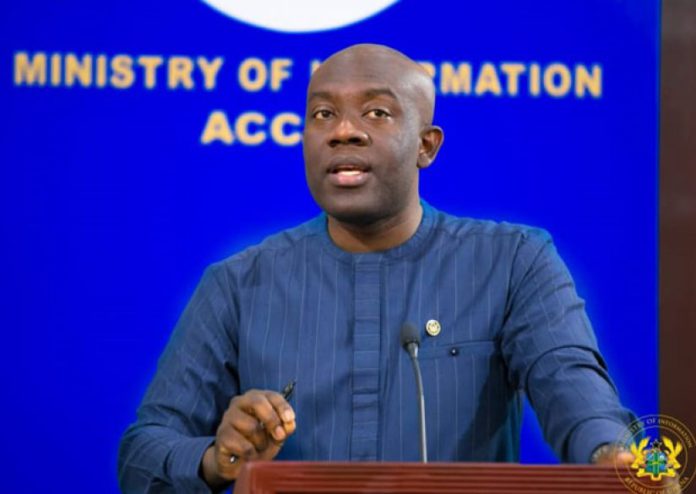
The Minister-designate for Information, Kojo Oppong Nkrumah, has explained that the reintroduction of a ban on social restrictions as announced by President Nana Akufo-Addo last Sunday, does not include the ban on marriage ceremonies.
Rather, he says the social activity of parties and/or receptions associated with occasions such as funerals and marriage ceremonies is what has been banned.
Consequently, he says, marriage ceremonies, which are held in the churches, and mosques where there is strict adherence to COVID-19 protocols can go on.
He gave the clarification on Tuesday at a press briefing on the government’s COVID-19 response in the country.
President Akufo-Addo last Sunday reintroduced a ban on all social events, including weddings, funerals, and other social events as part of interventions to halt the surge of the Coronavirus in the country.
The directive, according to the President, was based on data, which suggests that the surge in cases was a result of non-adherence to preventive protocols at such social gatherings.
The President’s announcement has, however, triggered discussions among some sections of the public.
Some have questioned why religious gatherings under strict protocols as prescribed and for two hours have been allowed but events such as funerals and weddings have been banned.
Throwing more light on the President’s directive, he explained that “the President did not say that marriages are banned.” Likewise, he said burial services were allowed but with a limited number of 25 persons at the ceremony.
“The president did not ban burial service because the activity of burial, we are actually encouraged to go on… What is banned in the funeral is where typically in the Ghanaian community we will all gather, shake hands, announcement, then they’ll call for a song, people will come and dance, where there is a little party associated with it. That is what has been banned.
“In the same way, when it comes to marriage, what the president has said is that, what in Ghana we call wedding, the full-blown wedding where we have a big party with a reception and people dancing and people eating, sitting at reception tables, etc, that is what has been banned.”
“We’ve got a lot of requests asking about so what if somebody is having a church service, which is allowed, and they choose to bless their marriage there as part of the church service. I’m not sure that is what has been banned. It’s the wedding. The full-blown wedding with its reception and social activity associated with it. That is what has been banned,” he explained further.
The Director-General of the Ghana Health Service, Dr Patrick Kuma-Aboagye, noted that as of January 30, 2021, Ghana had recorded 5,515 active cases, 424 deaths and 61,843 discharges or clinical recoveries.
He also noted that the Greater Accra Region accounted for 56.7 percent of total cases, while the Ashanti and Western Regions accounted for 16.0 and 6.1 percent of cases respectively.
He added that 294 persons, who had tested positive for COVID-19, were on admission, with 34 being critical, 122 being severe and 138 being mild to moderate cases.
